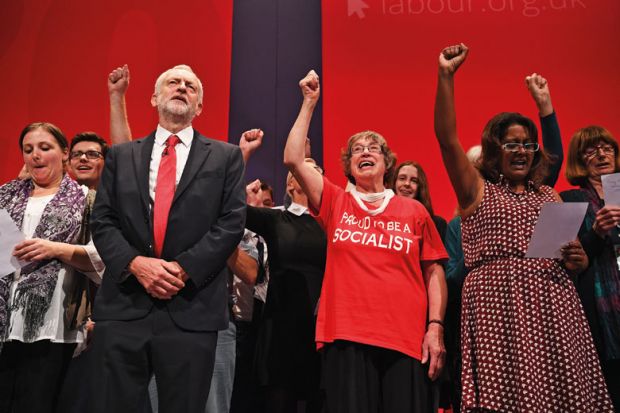Labour’s pledge to scrap university tuition fees was credited with winning the party support among young people, as the Conservatives failed to win a majority in the UK’s general election.
The poll left the Conservatives as the largest party in the House of Commons but, with all but a handful of constituencies declared, they had lost 12 seats. Labour had gained 29, and the Liberal Democrats were up four, with the Scottish National Party losing 21 seats.
Labour leader Jeremy Corbyn’s pledge to abolish university tuition fees was seen as having been key to encouraging a strong turnout among 18- to 24-year-old voters, estimated to have been as high as 72 per cent.
Student votes were seen as having been key to Labour victories in seats such as Canterbury, which was prised from Tory control for the first time since 1918, and Sheffield Hallam, where former Liberal Democrat leader Nick Clegg – who, as deputy prime minister, reneged on a pledge not to increase tuition fees – was defeated.
George Osborne, the former Conservative chancellor of the exchequer, described the election result as “the revenge of the young”.
“The young are coming out and voting and they are clobbering the Tory MPs in university towns and places like that,” he told ITV.
Universities will be watching closely for the impact on negotiations over the UK's exit from the European Union, with key issues over the status of EU staff and participation in EU research programmes at stake.
In key results from the night, Justine Greening, the education secretary, was re-elected in Putney with a much-reduced majority of 1,554, while Jo Johnson, the universities minister, was returned in Orpington.
Wes Streeting, the former president of the National Union of Students, was re-elected as Labour MP for Ilford North with a majority of 9,639, up from 589 in 2015, while Vince Cable, the former Liberal Democrat business secretary, won back the Twickenham seat that he lost two years ago.
The Liberal Democrats’ hopes of regaining Cambridge were dashed as Labour's Daniel Zeichner held the seat with an increased majority against Julian Huppert, the University of Cambridge academic who held the seat between 2010 and 2015.
Malia Bouattia, the president of the National Union of Students, said that student votes had played “a key role in marginal seats across the UK”.
“The student vote yesterday was about more than tuition fees,” she said.
“Having worked closely with nursing students at Sheffield Hallam University as they battled to save the NHS [and] University of Sheffield students fighting cuts to education...it is unsurprising that they sent a strong message in this election not only to the Lib Dems because of their betrayal, but also to the Tories and their destructive policies of cuts and privatisation.”
A poll of more than 1,000 students conducted by the Higher Education Policy Institute last month found that 55 per cent of respondents planned to back Labour, ahead of the Conservatives at 18 per cent.
A Times Higher Education poll of university staff, published last month, found 54 per cent backing for Labour, ahead of the Liberal Democrats on 24 per cent and the Conservatives on 7 per cent.




